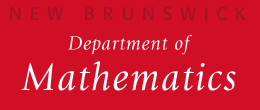General Information
This Interdisciplinary Topics Course number may be used (in specific sections) by the Mathematics Department for the development of interdisciplinary courses. Students register for 01:556:325
Fall 2019 Schedule
Foundations of Quantum Mechanics, previously offered as Math 395.
This course is normally taught every other year.
Prerequisites: CALC4 or permission of instructor (As far as mathematics is concerned, students need a working knowledge of complex numbers, eigenvalues of matrices, and partial derivatives. Prior knowledge in physics is not required but helpful.)
Contents: This interdisciplinary course, intended primarily for juniors and seniors majoring in mathematics, physics, or philosophy, deals with what can be concluded from quantum mechanics about the nature of reality. It has been claimed that quantum mechanics entails most radical consequences about the world and our knowledge of it, such as the existence of parallel universes, faster-than-light action-at-a-distance, limitations to what we can know, that reality itself be paradoxical, or that electrons become real only when observed. On the other hand, it has been claimed that quantum mechanics, in its orthodox formulation, be "unprofessional" (J. Bell), "incoherent" (A. Einstein), "incomprehensible" (R. Feynman), and "insane" (E. Schrodinger). We will investigate these claims, their basis and merits. The course will involve advanced mathematics, as appropriate for a serious discussion of quantum mechanics, but will not focus on technical methods of problem-solving.
Topics will include most of the following: The Schrodinger equation, the Born rule, self-adjoint matrices, axioms of the quantum formalism, the double-slit experiment, non-locality, the paradox of Schrodinger's cat, the quantum measurement problem, Heisenberg's uncertainty relation, interpretations of quantum mechanics (Copenhagen, Bohm's trajectories, Everett's many worlds, spontaneous collapse theories, quantum logic, perhaps others), views of Bohr and Einstein, no-hidden-variables theorems, and identical particles.
Text: J. Bell: Speakable and unspeakable in quantum mechanics, Cambridge University Press.
Learning goals: To understand the rules of quantum mechanics; to understand several important views of how the quantum world works; to be familiar with the surprising phenomena and paradoxes of quantum mechanics.
Current Semester
Previous Semesters
-
Fall 2013 : Foundations of Quantum Mechanics, Ward Stryve
-
Fall 2011 : Foundations of Quantum Mechanics, Prof. Tumulka
(Math 395 under interdisciplinary number 01:556:325) - Fall 2008 : Foundations of Quantum Mechanics, Prof. Goldstein (Math 395)
Disclaimer: Posted for informational purposes only
This material is posted by the faculty of the Mathematics Department at Rutgers New Brunswick for informational purposes. While we try to maintain it, information may not be current or may not apply to individual sections. The authority for content, textbook, syllabus, and grading policy lies with the current instructor.
Information posted prior to the beginning of the semester is frequently tentative, or based on previous semesters. Textbooks should not be purchased until confirmed with the instructor. For generally reliable textbook information—with the exception of sections with an alphabetic code like H1 or T1, and topics courses (197,395,495)—see the textbook list.








